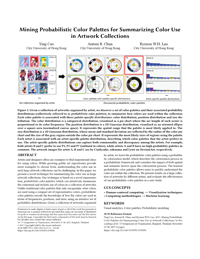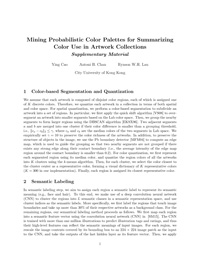Mining Probabilistic Color Palettes for Summarizing Color Use in Artwork Collections
SIGGRAPH Asia 2017 Symposium on VisualizationYing Cao Antoni B. Chan Rynson W.H. Lau

Abstract
Artists and designers often use examples to find inspirational ideas for using colors. While growing public art repositories provide more examples to choose from, understanding the color use in such large artwork collections can be challenging. In this paper, we present a novel technique for summarizing the color use in large artwork collections. Our technique is based on a novel representation, probabilistic color palettes, which can intuitively summarize the contextual and stylistic use of colors in a collection of artworks. Unlike traditional color palettes that only encapsulate what colors are used using a compact set of representative colors, probabilistic color palettes encode the knowledge of how the colors are used in terms of frequencies, positions, and sizes, using an intuitive set of probability distributions. Given a collection of artworks organized by artist, we learn the probabilistic color palettes using a probabilistic colorization model, which describes the colorization process in a probabilistic framework and considers the impact of both spatial and semantic factors upon the colorization process. The learned probabilistic color palettes allows users to quickly understand the color use within the collection. We present results on a large collection of artworks by different artists, and evaluate the effectiveness of our probabilistic color palettes in a user studyInterface
An interface that is developed based on the probabilsitic color palettes described in the paper, to help intuitive and efficient exploration of color use within large artwork collections.
Downloads

|

|
| Paper | Supplementary Material |
BibTex
@proceedings{Cao2017,
author = {Y. Cao and A. B. Chan and R. Lau},
title = {Mining Probabilistic Color Palettes for Summarizing Color Use in Artwork Collections},
journal = {SIGGRAPH Asia 2017 Symposium on Visualization},
year = {2017}
}